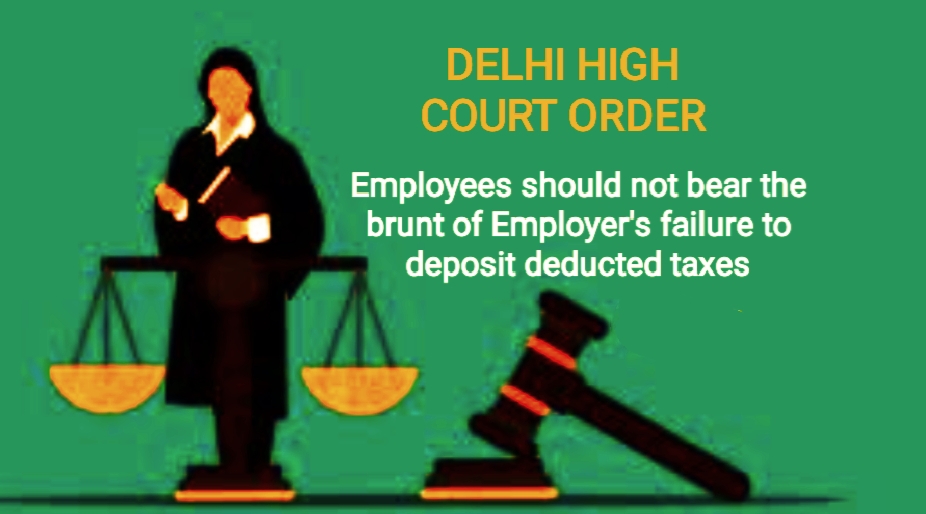Delhi High Court Ruling: Employee Not Liable for Employer’s Failure in Depositing TDS
Employee Not Liable for Employer’s TDS Failure: In a significant ruling on November 29, 2023, the Delhi High Court delivered a judgment in the case of Chintan Bindra vs Dy Commissioner of Income Tax, highlighting that employee should not bear the brunt of their employer’s failure to deposit deducted taxes. This article provides an in-depth analysis of the case, outlining key facts, the court’s judgment, and the implications for the petitioner.
Background of the Case:
Chintan Bindra, a Captain employed with Kingfisher Airlines Limited since April 16, 2008, faced challenges related to Tax Deducted at Source (TDS) for the Assessment Years (AY) 2009-10, 2011-12, and 2012-13. Despite TDS being deducted by his employer, it was not reflected correctly in his Form 26AS. This discrepancy led to a series of demands from the Income Tax Department, creating a complex legal battle.
Prayer of the Petitioner:
Chintan Bindra, through his petition, sought relief from the demands reflected on the income tax portal for AYs 2009-10, 2011-12, and 2012-13, due to TDS deducted by the employer. The petitioner urged the court to delete the demands from the portal, release wrongfully adjusted refunds, and grant statutory interest with compensatory interest on the adjusted refund amount of Rs. 3,88,209/-.
Revenue’s Contention:
On behalf of the revenue, it was argued that no credit for tax could be given to the petitioner as per Section 199 of the Income Tax Act. This section stipulates that credit can only be granted when the deducted tax is paid to the Central Government, which, in this case, was not done by the employer.
Court’s Judgment:
The court acknowledged the petitioner’s plea and the admitted factual position that demands were raised for outstanding income tax and interest. It was also noted that the petitioner received a salary after the deduction of income tax at source, but the employer, Kingfisher Airlines Limited, failed to deposit the deducted amount with the revenue.
The court, in its ruling, stated that since the petitioner had no control over the employer’s failure to fulfil its duty, he cannot be penalized. The judgment reinforced that the revenue authorities have the right to proceed against the employer for the recovery of the deducted tax.
As a result, the court allowed the petition, setting aside intimations/communications related to AYs 2009-10, 2011-12, and 2012-13. It restrained the respondents from carrying out any recovery proceedings based on these intimations and directed the refund of Rs. 3,88,209/- within four weeks.
Implications and Conclusion:
The Delhi High Court’s ruling in the Chintan Bindra case sets a precedent by protecting employees from the consequences of their employer’s failure to deposit deducted taxes. This judgment underscores the importance of holding employers accountable for fulfilling their role as tax-collecting agents.
The court’s decision brings relief to employees facing unwarranted demands and adjustments, emphasizing that recovery actions should be directed towards non-compliant employers. The case also highlights the need for a streamlined process to address TDS disputes, ensuring that genuine concerns of taxpayers are adequately addressed.
In conclusion, the Chintan Bindra case serves as a significant legal milestone in safeguarding the rights of employees in TDS disputes, setting the stage for a fair and just resolution of such matters in the future. As taxpayers navigate the complexities of income tax compliance, this judgment provides clarity on the distribution of responsibilities between employers and employees in the deduction and deposit of taxes.
Case No. W.P (C) 2164/2022 & CM APPL. 6192/2022; Case Title: Chitan Bindra Vs DCIT; Order Dt. 29.11.2023
To Know about newly Introduced “Discard Return Option” under Income Tax CLICK HERE
Read More
Prosecution Provisions Under Income-tax Act 1961: A Comprehensive Guide

